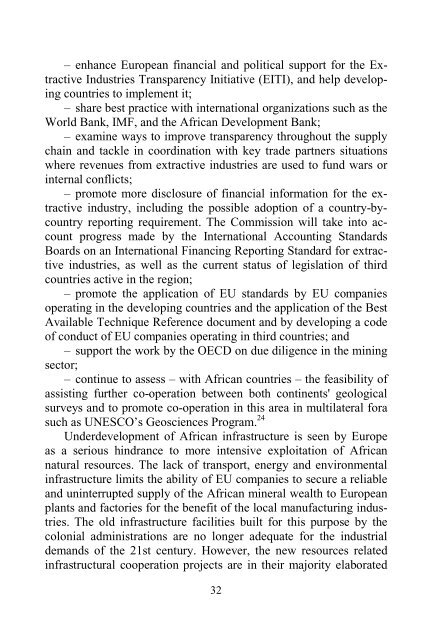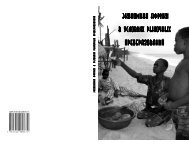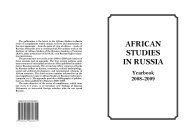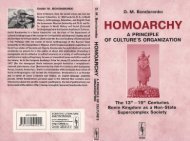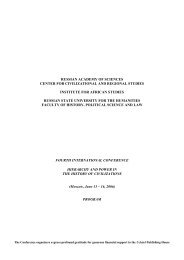L. Fituni, I. Abramova Resource Potential of Africa and Russia's ...
L. Fituni, I. Abramova Resource Potential of Africa and Russia's ...
L. Fituni, I. Abramova Resource Potential of Africa and Russia's ...
Create successful ePaper yourself
Turn your PDF publications into a flip-book with our unique Google optimized e-Paper software.
– enhance European financial <strong>and</strong> political support for the Extractive<br />
Industries Transparency Initiative (EITI), <strong>and</strong> help developing<br />
countries to implement it;<br />
– share best practice with international organizations such as the<br />
World Bank, IMF, <strong>and</strong> the <strong>Africa</strong>n Development Bank;<br />
– examine ways to improve transparency throughout the supply<br />
chain <strong>and</strong> tackle in coordination with key trade partners situations<br />
where revenues from extractive industries are used to fund wars or<br />
internal conflicts;<br />
– promote more disclosure <strong>of</strong> financial information for the extractive<br />
industry, including the possible adoption <strong>of</strong> a country-bycountry<br />
reporting requirement. The Commission will take into account<br />
progress made by the International Accounting St<strong>and</strong>ards<br />
Boards on an International Financing Reporting St<strong>and</strong>ard for extractive<br />
industries, as well as the current status <strong>of</strong> legislation <strong>of</strong> third<br />
countries active in the region;<br />
– promote the application <strong>of</strong> EU st<strong>and</strong>ards by EU companies<br />
operating in the developing countries <strong>and</strong> the application <strong>of</strong> the Best<br />
Available Technique Reference document <strong>and</strong> by developing a code<br />
<strong>of</strong> conduct <strong>of</strong> EU companies operating in third countries; <strong>and</strong><br />
– support the work by the OECD on due diligence in the mining<br />
sector;<br />
– continue to assess – with <strong>Africa</strong>n countries – the feasibility <strong>of</strong><br />
assisting further co-operation between both continents' geological<br />
surveys <strong>and</strong> to promote co-operation in this area in multilateral fora<br />
such as UNESCO’s Geosciences Program. 24<br />
Underdevelopment <strong>of</strong> <strong>Africa</strong>n infrastructure is seen by Europe<br />
as a serious hindrance to more intensive exploitation <strong>of</strong> <strong>Africa</strong>n<br />
natural resources. The lack <strong>of</strong> transport, energy <strong>and</strong> environmental<br />
infrastructure limits the ability <strong>of</strong> EU companies to secure a reliable<br />
<strong>and</strong> uninterrupted supply <strong>of</strong> the <strong>Africa</strong>n mineral wealth to European<br />
plants <strong>and</strong> factories for the benefit <strong>of</strong> the local manufacturing industries.<br />
The old infrastructure facilities built for this purpose by the<br />
colonial administrations are no longer adequate for the industrial<br />
dem<strong>and</strong>s <strong>of</strong> the 21st century. However, the new resources related<br />
infrastructural cooperation projects are in their majority elaborated<br />
32


